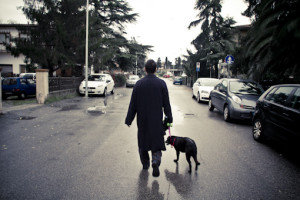A Transgender and Treccani. The way an Italian encyclopedia sees me.

ph. Sarah Kashna
Here the original version by Egon BotteghiÂ
This translation is by Lea Vittoria Uva and Irene Wight
My name is Egon and I am a 42 year old transsexual man. Since I “decided” to deal with who I am, I have paid a high price to this society that still has a strong resistance against people like me.
The stereotype-transsexual is a biological male, a pervert, “so homosexual” that he feels like a woman, prone to prostitution and criminality. Even though the reality of people like me, men born in a biologically female body, is slowly starting to become known (which helps deconstructing this prejudice), the stigma is hard to die: for the self-righteous part of society, we are perverts, exaggerated, disturbed, mad, unnatural, constructed, childish, irresponsible, selfish, indecent.
The family that deals with the coming out of a transsexual person goes through a “storm”.
The family I once had is broken, I am separated; I had to escape from my home and was thrown out of work.
Luckily I have obtained the joint custody of my children.
My original family, instead, reacted in an ambivalent manner; they helped me finding a job and a house, but my transsexuality was perceived as a tragedy and my parents weren’t talking to me anymore.
Perhaps it’s comprehensible, maybe it’s almost a physiological reaction, as my situation was beyond any conception and therefore impossible to even contemplate.
For them I was just a lesbian who had lost control, a selfish person who didn’t understand what I was doing.
After three years on this path of mine, including visits to psychiatrists, never-ending tests with psychologists, endocrinal visits, appearances in court, it was after breast removal surgery that my mother came to tell me (in her words) that she had made the leap to accept me for what I am.
She would like my father to calm down and talk to me again, that our relationship get better, and she asks me the favor of finding medical explanations of my situation for him (their speaking directly with the specialists who follow me is, for now, out of the question!)
I have found many testimonials from other trans people, often with children, who also had to face my same experience of exclusion and of being devalued, but my mother would like to rely on medical authority.
By coincidence, in that exact moment, the press came out with a strange case: many newspapers published an article that could have ruined the slow progress of acceptance by my family, and my patience while waiting for that moment.
The news was about a meeting held to celebrate the 20 years of activity by SAIFIP, service of adjustment between physical identity and psychological identity, by S. Camillo of Rome. Aldo Morrone, general director of this hospital, said that in the last 5 years sex change operations had multiplied by 25 per cent, despite the economic crisis.
Now I wonder, why talk of the economic crisis while talking about the health of people (who, by the way, effectively suffer because of the crisis, considering that the growing shortage of funds means longer waiting lists for operations): we transsexuals are not the same as restyling an expensive car or collecting fashion magazines.
It gives the idea that we’re talking of body-factories to satisfy the fads of crazy people.
In fact defamatory articles have appeared in newspapers, of special note the article in Il Giornale. “Mister” Veneziani, thinking it’d be funny, wrote “How do Italians react to the crisis? By changing jobs, political party, their bank, the country? No, by changing sex. I have before my eyes true and impressive statistics: since the start of the crisis, sex change operations have spiked in an alarming way”. He continued in a sneering manner to ridicule the situation of transsexual people, while in a more informed country he would have been taken to task; for example, when he writes “it’s easier than changing an identity card”, does Veneziani have any idea of how many years we need to change documents, how many operations we must suffer, how much blood and tears it costs?
Outraged by what they’re writing, we are reminded of other things we’ve seen and read, for example the article by a doctor on an endocrinology site, where there were so many false statements about FtM people that the article had to be immediately removed from the site following protests from the transgender community.
And here we get to the definition in the Treccani encyclopedia, which was brought to my attention by a transgender woman.
It’s the definition of the word “transgender” contained in the Medical Dictionary of 2010, this being a reputable publication, not Grandma Duck’s advice in the “Junior Woodchucks Guidebook”.
Whoever wrote it started by saying that “usually transsexuals abhor homosexuality”, ignoring the fact that many transsexual people are homosexual, i.e, gay transmen and lesbian transwomen; it also drops this heavy word (“abhor”) between these two groups of people (homosexuals and transsexuals), who have, instead, strenuously fought together at least since the Stonewall revolution in 1969 to revendicate their rights to a life free of oppression, prejudice and fear.
It continues by stating that “the transsexual person tries to change nature’s mistake with their body. Depending on their social and economic possibilities the transsexual tries to remedy with hormones and medicines, aesthetic surgery and eventually with the so called sex change operations. In reality surgery does not have this power, at best it offers an artificial appearance while destroying the original anatomy”.
To say that transgender people consider their body a mistake of nature signifies adhering to an idea that is antiquated and built by medical science (though this being a medical dictionary, no surprise); an idea that does not reflect the majority of today’s transgender people in Italy.
In reality if you ask the interested parties they will explain they feel like being born in a wrong world rather than being in a wrong body.
To affirm that a sex change operation does not correct the original mistake but only destroys the healthy part of a person, is the first of a long series of statements that are heavily, though subtly, judgmental: personal opinions of the author, who clearly follows a certain school of thought (I’d say psychoanalytic), but who gives for granted that their opinion is the absolute authentic truth, rather than considering it for what it is: a singular vision within a complex context that is the questioning, by the medical professionals, of transsexuality.
In fact, the author of the definition claims the right to state that destroying our bodies is “exactly what these patients want on a subconscious level: to attack and destroy their ‘bad’ male or female part of their psychophysical identity, with a secondary fantasy of maniacal reparation (→ reparation and reconciliation) of constructing the anatomy of the opposite sex. The author also reminds us (in case we actually wanted to speak up and say our opinions on the matter, to have a voice that is autonomous from doctors, to go down the streets and fight for our rights) that “transsexualism is a psychotic kind of pathology, a circumscribed delirium, strenuously resistant to psychological therapy, particularly in our times, where a big ideological collusion has developed in social and medical field. These pathologies are confused with homosexuality (→ sexuality) and the problem shifts on the level of civil rights, reducing the already low number of subjects who are willing to confront their deep psychopathological issues”.
It couldn’t be more clear: stop going to gay pride (even though the pride and liberation movement was started by a transgender woman who threw a shoe at an officer, during one of the usual police raids against the ‘lgbtqi’ people) and lock yourselves in the studio of your psychiatrists to have your “delirious” though “strenuously resistant” mind reprogrammed.Â
What would the encyclopedic author say if they knew our psychologists are paid to help us through this complex transition, made more difficult even by the prejudice still preached by Treccani?
They would maybe say the same as my mother, before her moment of illumination, when she screamed that my psychologist was madder than me and that she hated her because, instead of stopping me as she had hoped, she was helping me get rid of the anxiety that my situation was causing me.
I am therefore surprised that the curator is fully conscious of the reality, as it’s shown when they describe what happens in Italy, i.e. “For about 25 years public assistance has been providing group therapy preparatory to hormonal therapy and surgery, mandatory premises for change of biological sex on official documents. This position, based on the idea of correcting nature’s ‘mistake’, prefers to eliminate the problematic psychological disorder rather than confronting the complexity of identity. There is actually no real evidence of a biological cause for this disorder. Those who propose hormonal and surgical therapies are aware of this, and they only try to reduce (more or less stably) the suffering of the patients on a symptomatic level. On the other hand, it is known that authentic carriers of chromosome alterations develop an identity more in line with the type of education in early years and not in relation to their chromosomal combination. Psychotherapists’ efforts should therefore be to help these people transfer their drama onto a symbolic level, not anymore chained in the physical concreteness of their bodies. Transsexual people should be helped to tolerate doubts, to endure the limits of reality, to find a less destructive compromise between their suffering and their defenses, to improve their psychophysical relationship with themselves and others.”
From all this we can conclude by saying that:
(1) the author, although criticizing the idea that transsexuality is ‘nature’s mistake’, shows that they’re not aware that this is an old story fabricated by medics about trans* people, a kind of ad hoc theory that they still try to validate, unsuccessfully. An idea that trans* people accepted in order to obtain what was necessary to them in order to survive here and now (sort of like: I tell you what you want to hear, and you give me what I want, meaning the social recognition of my gender identity, the only way to live decently in the society I was born into).
(2) the solution proposed by the illustrious author, seems to be to just leave alone transsexual people who, with their gender peculiarity, clash and are crushed by this society based on the sexual binary male-female and the gender binary man-woman, while waiting for the others to question the “complexity of identity”.
(3) the author themself shows to be still anchored in J. Money’s teachings about educating children on gender (the above mentioned “genius”, psychologist, sad that you could easily reassign the sex of intersexual newborns, since family and environment would take care of raising them as females, omitting in his studies all the suicides and failures). It’s relevant to highlight how intersexual people are defined as “authentic (are we trans fake?) carriers of alterations”.
(4) the author then concludes by saying that all those professionals who are following us in our delirious rants, who clearly have understood nothing, should help us “to tolerate doubts, to endure the limits of reality, to improve our psychophysical relationship” with ourselves “and others”…
evidently with my mother too; should she ever read this illustrious definition, maybe authoritative enough for her, she will go back to seeing me as her daughter’s murderer.






